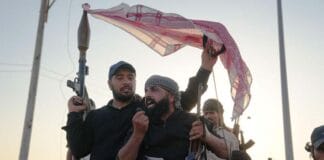The Syrian revolution began with peaceful mass demonstrations in the city of Deraa in April 2011. More than 60 protesters were shot in the first fortnight.
Local Coordinating Committees (LCCs)
In the first days of the uprising, thousands of LCCs sprung up to organise protests and publish newspapers. Their aim remains to establish “a civil, pluralistic, and democratic state” and they reject attempts by outside powers to hijack the revolution.
Many of these committees provide services to local people and to internally displaced refugees in areas abandoned by the regime. Yet they have little financial support to maintain these services—a situation exacerbated by the regime’s destruction of infrastructure such as factories, power stations, bakeries and hospitals.
Some councils have been joined by judges and lawyers who defected from the regime and extended their control over courts and prisons. In the town of Manbij, northern Syria, many police abandoned the regime and began taking orders from the revolutionary committee. In Saraqeb civil servants re-opened ministry buildings under the control of a council that has to be re-elected every three months.
Free Syrian Army (FSA)
Early in the uprising many towns and cities that rose against the regime took up arms. They were joined by mutinous soldiers to form “free army brigades”. They remain the largest single armed opposition grouping. The FSA is a label used by diverse forces not actually under common leadership.
In recent weeks, some brigades have declared their opposition to US-led air strikes. Others want US arms and air strikes to assist their operations. Most FSA groups have limited weaponry that has mostly come from raids on government arms depots.
The US wants to hijack the revolutionary movement. They would like to see a repeat of Libya, where the West backed former loyalists to dictator Gaddafi inside the opposition to take power and demanded they recognise all existing commercial contracts with Western multinationals as the price for intervention.
But the US is extremely uncertain that the Syrian rebels will reliably serve their interests. It only agreed to send light arms to carefully selected rebel groups at the end of July this year, two years after the formation of Free Syrian Army.
Syrian National Council (SNC)
While it has links with some sections of the Free Syrian Army, the SNC is dominated by pro-Western exiles with little connection to grassroots organisations inside Syria. They have been lobbying for Western military intervention for some time and have declared themselves the “transitional government”. They also refuse to recognise the rights of the Kurdish people in Syria.
Islamist groups
It has suited the Syrian regime to argue that the resistance is now overwhelmingly Islamist. Bashar Al-Assad asserts that what is happening in Syria “is not a revolution” but merely gangs of “murderers and criminals” and “al-Qaeda terrorism”.
Islamist groups have been the main recipients of weaponry from pro-US Gulf states like Saudi Arabia and Qatar. This access to arms has given them an advantage over other rebel groups and seen their influence grow.
Hardline Islamist groups like Jabhat al-Nusra and the Islamic State of Iraq and al-Sham have committed brutal reprisals against other rebels and tried to impose their own control. In July, they killed a prominent FSA commander, Kamal Hamami. Civilian-led protests against them have occurred in liberated areas.
The larger Islamist groups include the Syrian Islamic Front and the Syrian Liberation Islamic Front, with tens of thousands of fighters. They are more moderate but still see the struggle against the regime as a sectarian battle against Shia Islam.
Despite the growing influence of fighters backed by the Gulf States, the revolution retains a substantial core fighting for a democratic Syria.
They face enemies on all sides—sectarian Islamists, Western intervention and the brutal Assad regime. They deserve political support. They carry the hope of a democratic revolution against Assad.
Mark Goudkamp





